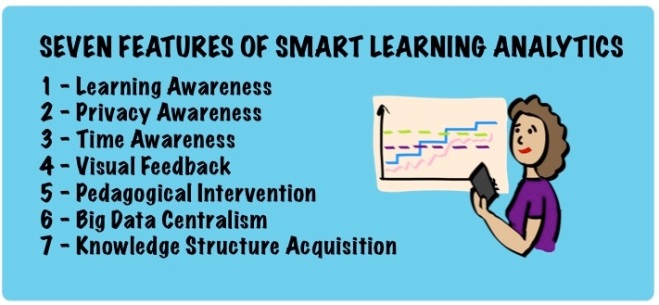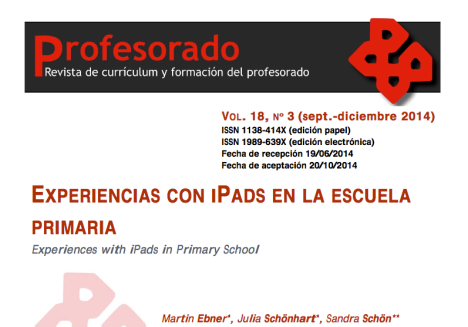Ich durfte am neuen Buch „Das neue Arbeiten im Netz“ von der Initiative WerdeDigital.at mitarbeiten und ein Kapitel mit Sandra rund um freie Bildungsressourcen schreiben. Das gesamte Buch findet man hier, unseren kleinen Essay hänge ich gleich hier dazu.
Zitation: Schön, S.; Ebner, M. (2015) Warum Trainer_innen und Lehrende offene Bildungsressourcen benötigen, In: Das neue Arbeiten im Netz, Akin-Hecken, M. & Röthler, D. (Hrsg.), edition mono/monochrom, Wien, S. 162-164
Lehrer_innen, Trainer_innen in der Weiterbildung oder Lehrende an Hochschulen sind auf gute Lern- und Unterrichtsmaterialien angewiesen. Und natürlich nutzen sie, wie viele Wissensarbeiter_innen das Internet, um da und dort etwas nachzulesen, sich inspirieren zu lassen oder um Vorarbeiten von anderen zu nutzen.
Zwar ist die Nutzung von Internetmaterialien für das individuelle Lernen aus rechtlicher Perspektive weitgehend unbedenklich, wenn Lehrende jedoch Material aus dem Internet für ihren Unterricht verwenden möchten, setzt ihnen das Urheberrecht insbesondere im deutschsprachigen Raum enge Grenzen. Ungefragt dürfen i.d.R. keine Texte, Bilder oder Videos eingesetzt werden31.
Wenn Lehrende ihre Unterlagen nicht komplett neu erstellen und auf der sicheren Seite sein möchten, hilft Ihnen seit einigen Jahren der Griff zu bzw. die gezielte Suche nach sogenannten “offenen Bildungsressourcen” (engl. “Open Educational Resources”, kurz OER). Darunter werden Materialien für Lernende und Lehrende verstanden, welche kostenlos im Web zugänglich sind, über eine entsprechende Lizenzierung zur Verwendung verfügen und auch zur Modifikation freigegeben sind (Geser 2007; Mruck et al. 2013). Dazu werden v.a. die Creative-Commons-Lizenzen eingesetzt (i.d.R. werden die Lizenzen CC BY und CC BY-SA als OER-konform betrachtet).
Einige Initiativen und Projekte zeigen, dass offene Bildungsressourcen gefragt sind. So verzeichnet das offene Lehrbuch “Lernen und Lehren mit Technologien” (kurz L3T, l3t.eu) bereits mehr als 360.000 Downloads, beim ersten offenen Online-Kurs zum Thema (coer13.de) haben sich mehr als 1.000 Lernende angemeldet und die UNESCO wie auch die Europäische Kommission fordern und fördern seit einigen Jahren OER-Aktivitäten.
OER sind auch eine Hilfe, wenn der Unterricht mit modernen Hilfsmitteln – Laptops, Tablets und Beamer – durchgeführt wird. Lehrende können moderne Geräte wie den Beamer im Klassenzimmer oder dem Seminarraum oft nicht nutzen, ohne sich in einem juristischen Graubereich zu befinden, da die Vorführung einer sogenannten “Digitalkopie” im Unterricht nur in Ausnahmefällen erlaubt ist.
Die gängige Praxis, dass für den Unterricht oder für Lehrgänge spezifische Lehrwerke eingesetzt werden, die in der Regel (zumeist nur) in gedruckter Form zur Verfügung gestellt werden, setzt der OER-Verbreitung derzeit enge Grenzen. Gerade in der Schule müssen sich Lehrer_innen an den Aufgaben und der Struktur im Schulbuch orientieren. Übungsvarianten können nicht im Internet veröffentlicht werden, da das Schulbuch urheberrechtlich geschützt ist, also z.B. auch die dort gewählte Reihenfolge der Vokabeln.
Neben den Lehrenden in den unterschiedlichen Bildungssektoren und Branchen profitieren natürlich auch Lernende und Eltern von der Entwicklung von offenen Bildungsressourcen, da sie dadurch hilfreiches Material im Internet finden. Gleichzeitig wirken sich OER und ihre Förderung auf die etablierten Geschäftsmodelle von (Schul-) Buchverlagen aus. Gerade dort, wo seit vielen Jahren Erfahrung mit der Erstellung von Lehrmaterialien gesammelt wurde, gibt es keine große Begeisterung für diese Bewegung. Wie sich die Bedenken und Widerstände dieser Kritiker_innen und die Erfolge der Aktiven letztlich auf größere bildungspolitische Entscheidungen auswirken, wird sich zeigen. Die Beispiele von Wikipedia und der Open-Source-Bewegung führen jedoch vor, wie vermeintlich alternative Randbewegungen tradierte Prozesse und tradiertes Denken auf den Kopf stellen können.


